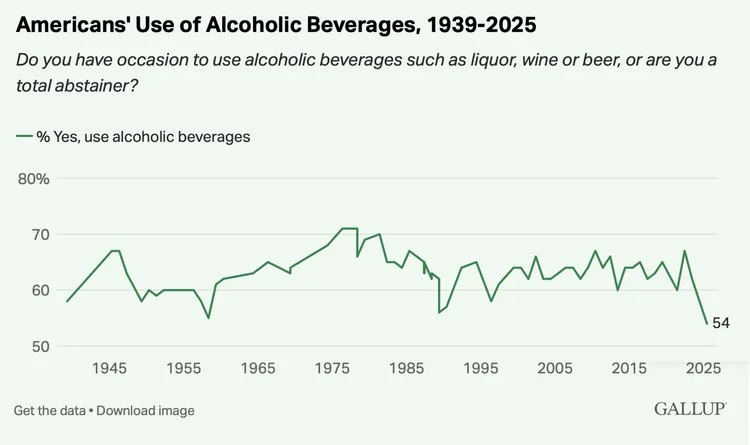Let’s Discuss Gallup’s Finding that the Number of American Drinkers is down 19%
This week, Gallup released their latest annual survey on American drinking habits, and it caused a bit of a stir. here’s how the polling service framed their findings:
“The percentage of U.S. adults who say they consume alcohol has fallen to 54%, the lowest by one percentage point in Gallup’s nearly 90-year trend. This coincides with a growing belief among Americans that moderate alcohol consumption is bad for one’s health, now the majority view for the first time.”
The annual poll often stokes interest, and I’ve been commenting on it for at least fifteen years. It usually has a striking finding. Just last year, in fact, Gallup’s numbers caused a five-alarm fire in the beer industry, as drinkers favoring wine (33%) pulled within a point of those favoring beer (34%). A year earlier, in 2023, it had been an 8% gap. Single findings often get interpreted this way, through the lens of whatever conventional wisdom happens to grip the industry. Beer is, if anything, doing worse in 2025, so was this the year Americans were finally choosing an other alcohol as their fave? Let’s see, according to this year’s poll, beer was back in a clear first-place position, 9% ahead of wine.
Oh.
Gallup’s numbers have always been very “noisy,” to use the language of statisticians—that is, they bounce around a lot. Just three years ago, in 2022, the number of US adults who say they consumed alcohol regularly was 67%. You have to go all the way back to 1981 to find a higher percentage of Americans identifying as drinkers.
You can see the noise in the graph, reproduced at the top of this post. It shows a number that jumps around dramatically, year to year, but which stays roughly within a totally consistent band. Fifty-four percent is a very low figure, and we can unpack what it means. But for that to reflect the actual behavior of Americans, it would mean that the number of teetotalers has jumped 19% in three years. People’s opinion about many things do hop around a lot year to year, but their basic life habits are more stable. The overall line of consistency here is a far more important finding than the results of any given year.
Things may be bad for alcohol, and the hype surrounding non-alcoholic alternatives remains deafening. Yet when we look at consumers’ revealed preferences—what they do, rather than what they say—we don’t see anything like this kind of collapse. If just a large percentage of Americans had just stopped drinking, we’d see it in sales figures. And, while sales are down, they don’t reflect the freefall measured in Gallup’s poll numbers.
Indeed, there’s some evidence that people answer survey questions aspirationally rather than accurately. According to one survey, 61% of Gen Z and Millennials—a big chunk of the drinking population—say “they’d choose a non-alc version of their favorite beer.” That is a preposterously high number and reflects nothing we’re seeing in the data. (Beer overall is down 6% in 2025, and N/A up 16%, which are significant numbers—but nothing that accounts for tens of millions of drinkers suddenly switching to NA two-thirds of the time.)
I posted a version of this on the free newsletter I send out each week. It includes a digest of my recent posts—the reason I initially created it—but also a beer recommendation, links to posts elsewhere, and occasionally original content. You can subscribe in the form to the left or above (depending on your device). I will never share or, god forbid, sell your addresses, nor clog your inbox.
Americans have been changing their relationship to drinking over time. For decades, per-capita consumption has been falling, so a continuation of that trend would make sense. Yet the data are somewhat confounded because of the way Gallup poses the question of drinking. (“Do you have occasion to use alcoholic beverages such as liquor, wine or beer, or are you a total abstainer?”) Some people barely drink at all—maybe once a month—while others hit double digits every day. If those beer-a-month drinkers go cold turkey, it’s not going to show up in the sales figures, nor would it reflect much of a change in American society. Yet Gallup and the media framed the finding as something far-reaching and permanent:
“The percentage of U.S. adults who say they consume alcohol has fallen to 54%, the lowest by one percentage point in Gallup’s nearly 90-year trend. This coincides with a growing belief among Americans that moderate alcohol consumption is bad for one’s health, now the majority view for the first time.”
It may well be that a chunk of Americans are giving up alcohol permanently. But this is a single data point in a series of noisy annual findings. Since the 1980s, somewhere around 63-64% of Americans have self-identified as drinkers. On any given year, the variance from that baseline might be significant, but it has reverted to the mean remarkably consistently. Maybe that won’t happen this time around. But the smart money says wait and see before settling on this as the final word.


